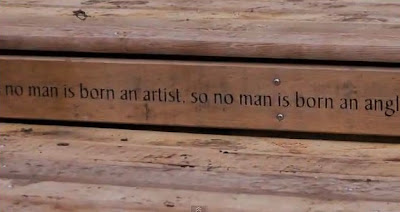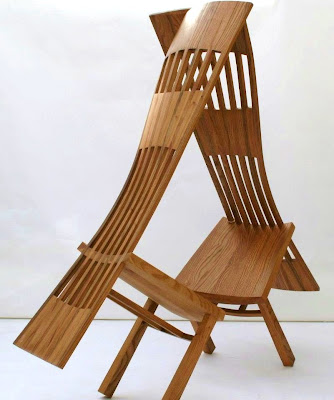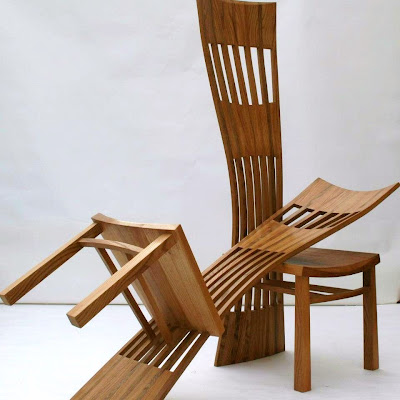Showing posts with label steam bent. Show all posts
Showing posts with label steam bent. Show all posts
Wednesday, 4 April 2018
Matthias Pliessnig
Matthias Pliessnig's 'spill bench'. Matthias is a sculptor and furniture maker who specialises in organic steam bent flowing forms. His benches are made from steam bent strips of white oak they have a fluid dynamism and breathtaking sculptural form.
His first love was airplanes and he planned on being a pilot, however his eyesight wouldn't permit this career choice and he went to study at Rhode Island School of Art and Design. It was building a boat one summer that captured his imagination and fascination with skeletal wooden structures, that are extremely light and strong.
Using computer aided surves and laborious craftsmanship Matthias has become obsessed with creating these incredible, elegant, languid structures and combining them with functionality.
Saturday, 21 March 2015
Samuel Rosenberg
Steam bent interlocking units known as 'snap system', by Samuel Rosenberg designed as a toy concept, but I like this idea as a joining mechanism for tables,stools and chairs. Samuel is a young student studying Furniture Design at The Rhode Island School of Design. He has an interesting portfolio, I am looking forward to seeing his work developing.
Tuesday, 17 February 2015
Dylan Pym
"My particular passion lies in the age old art of steam bending. I feel it gives my work a unique, organic, flowing quality. I have experimented with this process, developed and perfected it, enabling me to steam bend whole planks of wood. I find it fascinating, and have been able to incorporate it into my designs." Dylan PymInspired to make furniture after the storm of 1989 Dylan sought an apprenticeship, but being unsuccessful in this then when to a local college where he struggled due to dyslexia. He set up his own business that uses only storm damaged and locally felled trees and has an annual hardwood tree planting programme.
Dylan started using steam bending techniques about ten years ago and states that once you start using curved wood the use of machinery becomes superfluous he prefers to work using hand tools it is more natural and intune with the timber.
Tuesday, 12 August 2014
Андрей Скрипка (Andru Skripka)
Steam bent glued elements allow strength and flexibility like a cloistered fingers into the palm. 'Amistia' is a chair by young Ukrainian designer Andru Skripka.
Tuesday, 23 July 2013
Petter Southall
Petter Southall makes very simple and very complex furniture often featuring steam bent elements.
"Petter Southall learned to work wood building traditional Norwegian sailing, rowboats. Working with numerous old boat builders in boatyards tucked away in the fjords of western Norway, Petter learned to steam bent large sections of timber, to work curves by eye and to understand the breathing organic material that is wood.
Most of all he fell in love with the most ambitious of all traditional Norwegian boats, the Oselvar Faering. A direct descendant of the rowboat found in the Gokstad Viking Ship now conserved in the Viking Ship Museum in Oslo, the Oselvar Faering has only three very wide strakes in a clinker-built construction. The boat is so light and flexible, it surfs on top of the waves, making for a very exciting sail. It is called the Stradivarius of the Seas because it is so hard to build and so beautiful to sail.In 1980, aged 20, Petter was selected by the Horda Folk Museum, Bergen, to be one of eight boat builders to be taught to build the Oselvar Faering by John Askvik and Karl Søvik, the ageing last members of the boat-building families who had kept the design well guarded, passing it down from generation to generation since the Vikings.
Petter went on to make many Oselvars but he still sails his first one from West Bay harbour in Dorset. The craftsmanship required to make this particular design and the beautiful lines of its three wide twisted strakes have been an inspiration for many of Petter’s most successful furniture designs. In fact it is while enjoying the freedom of sailing his boat out in Lyme Bay that design solutions and new concepts often come to him. The source for the Art Deco streamlined appearance of many of his designs may be more connected to their inspiration from wind and sea than from the study of design history."
"Petter Southall learned to work wood building traditional Norwegian sailing, rowboats. Working with numerous old boat builders in boatyards tucked away in the fjords of western Norway, Petter learned to steam bent large sections of timber, to work curves by eye and to understand the breathing organic material that is wood.
Most of all he fell in love with the most ambitious of all traditional Norwegian boats, the Oselvar Faering. A direct descendant of the rowboat found in the Gokstad Viking Ship now conserved in the Viking Ship Museum in Oslo, the Oselvar Faering has only three very wide strakes in a clinker-built construction. The boat is so light and flexible, it surfs on top of the waves, making for a very exciting sail. It is called the Stradivarius of the Seas because it is so hard to build and so beautiful to sail.In 1980, aged 20, Petter was selected by the Horda Folk Museum, Bergen, to be one of eight boat builders to be taught to build the Oselvar Faering by John Askvik and Karl Søvik, the ageing last members of the boat-building families who had kept the design well guarded, passing it down from generation to generation since the Vikings.
Petter went on to make many Oselvars but he still sails his first one from West Bay harbour in Dorset. The craftsmanship required to make this particular design and the beautiful lines of its three wide twisted strakes have been an inspiration for many of Petter’s most successful furniture designs. In fact it is while enjoying the freedom of sailing his boat out in Lyme Bay that design solutions and new concepts often come to him. The source for the Art Deco streamlined appearance of many of his designs may be more connected to their inspiration from wind and sea than from the study of design history."
Friday, 5 October 2012
Jonathan Lassen
Wednesday, 1 August 2012
Marc Newson
Tuesday, 12 June 2012
Angus Ross Workshop II
Having been shown the models and around the showroom, we were then able to see Angus Ross's workshop and see first hand the techniques and equipment used to create his furniture and public art. The students were most inspired and I look forward to seeing how their careers develop in the light of these inspiring workshop visits. To see video's of Angus and his colleagues working go here, to see former posts about Angus Ross go here.
Angus Ross Workshop I
It was a great treat today to be able to visit the workshop of one of Scotland's leading furniture designers Angus Ross. Highly informative and inspiring. Angus first shared the value of model making as part of the furniture design and construction and also as a way of presenting bespoke designs to the customer.
Friday, 16 March 2012
Flip Garden Chair
Sunday, 19 February 2012
Angus Ross III




 In 2011 Angus Ross Studio was commissioned by Canterbury Council to "enhance the experience of using a riverside walk". Inspired by the ripples and eddies of the river the studio created a series of sculptural fishing platforms. You can see a film of the work involved in creating these sizable structures from steam bent Scottish oak.
In 2011 Angus Ross Studio was commissioned by Canterbury Council to "enhance the experience of using a riverside walk". Inspired by the ripples and eddies of the river the studio created a series of sculptural fishing platforms. You can see a film of the work involved in creating these sizable structures from steam bent Scottish oak.Tuesday, 10 May 2011
Kino Guerin



"I like challenges. I gave myself one a few years ago, one that would become my levimotiv : from now on, I would make furniture with a unique piece of wood, no legs, no crossbars or supports" Kino Guerin
"Kino Guerin is a master at bending a rigid material to get this beautiful flow and movement. he creates an elegance. A beautiful, lyrical flow." Michael Monroe
Kino Guerin also uses amazing veneers such as bloodwood, lacewood and zebra wood to create the unique finishes on his pieces.
Tuesday, 8 February 2011
Angus Ross I


Angus Ross is a Scottish furniture designer based in Aberfeldy, Perthshire. He has a wonderful portfolio, containing works with a great simplicity of line and form that uses many difficult technical processes to create.
Monday, 7 February 2011
Subscribe to:
Posts (Atom)


































